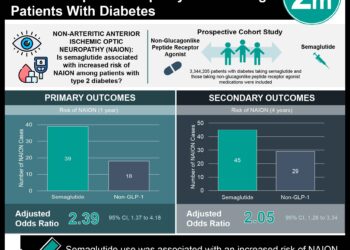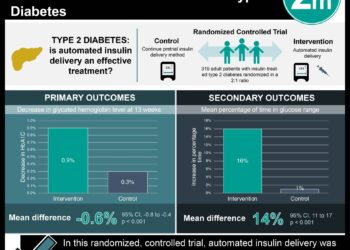Diet and gastric bypass have similar metabolic benefits in diabetic patients
1. Diet alone had nearly identical benefits on insulin sensitivity compared to gastric bypass surgery.
2. The metabolic benefits from diet and gastric bypass surgery were related to weight loss.
Evidence Rating Level: 2 (Good)
Study Rundown: Previous studies have demonstrated that bariatric surgeries are far more effective than medical therapy to treat type 2 diabetes. However, many of these studies have results which are confounded by the difference in weight loss among the participants undergoing these procedures. Because of this, the effects of bypass surgery independent of weight loss on major factors in type 2 diabetes pathogenesis such as beta-cell function and insulin resistance is unclear. As such, this study evaluated whether gastric bypass surgery provided metabolic benefits, independent of weight loss, in participants with obesity and type 2 diabetes. The results of the study demonstrated that both diet and gastric bypass surgery confer metabolic benefits, which were actually related to resulting weight loss from the interventions. This prospective cohort study was limited by the assessment of metabolic outcomes after weight loss between 16 to 24%. Therefore, the study results could not be extrapolated for weight loss above or below that range. Nonetheless, this study was strengthened by matching participants based on weight loss to control for the confounding variable.
Click to read the study in NEJM
Relevant Reading: Effects of moderate and subsequent progressive weight loss on metabolic function and adipose tissue biology in humans with obesity
In-Depth [prospective cohort]: This prospective cohort study followed 33 participants at a single center in the United States. Participants included in the study were diagnosed with type 2 diabetes and obesity. Participants unable to achieve the target weight loss, defined as 16 to 24% of the participant’s original weight, were excluded from this study. The participants underwent a comprehensive metabolic function assessment before and after weight loss from gastric Roux-en-Y bypass surgery or low-calorie diet therapy. The diet group received weekly education on dietary practices and prepackaged meals. Prior to analysis, the participants were matched between the two intervention groups based on percentage of weight loss. Once the participants achieved the target weight loss, the body weight was maintained for three weeks before conducting the final comprehensive metabolic function assessment. The primary outcome was the change in hepatic insulin sensitivity. The mean weight loss in the diet group was 17.8±1.2% (range, 16.1 to 20.4) and 18.7±2.5% (range, 16.0 to 24.4) in the surgery group. Insulin sensitivity in the liver increased after weight loss in the diet group (31.0 μmol/kg; 95% confidence interval [CI], 22.5 to 39.6) and the surgery group (25.1 μmol/kg; 95% CI, 16.4 to 33.8). There was no significant difference between the two group (-6.5 μmol/kg; 95% CI, -15.7 to 2.7). Additionally, beta-cell function increased after weight loss in the diet group (1.83; 95% CI, 1.22 to 2.44) and in the surgery group (1.11; 95% CI, 0.08 to 2.15); however, there was no significant difference between the two groups (-0.71; 95% CI, -1.75 to 0.34). Interestingly, weight loss in both groups resulted in a decrease in plasma bile acids, plasma branched-chain amino acid, and C5 acylcarnitine concentrations. However, the decrease in these plasma components were greater for the surgery group than the diet group. Taken together, weight loss resulting from diet or gastric bypass surgery provided near identical benefits for insulin sensitivity in participants with type 2 diabetes and obesity.
Image: PD
©2020 2 Minute Medicine, Inc. All rights reserved. No works may be reproduced without expressed written consent from 2 Minute Medicine, Inc. Inquire about licensing here. No article should be construed as medical advice and is not intended as such by the authors or by 2 Minute Medicine, Inc.







